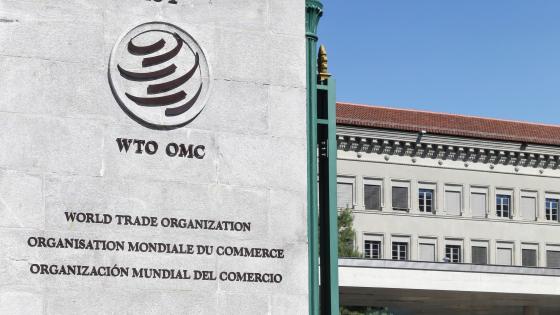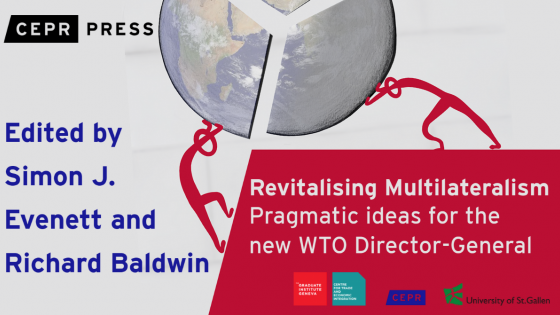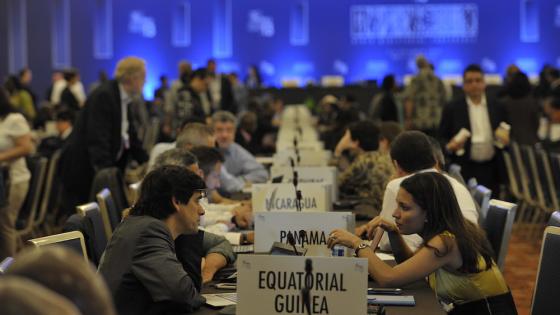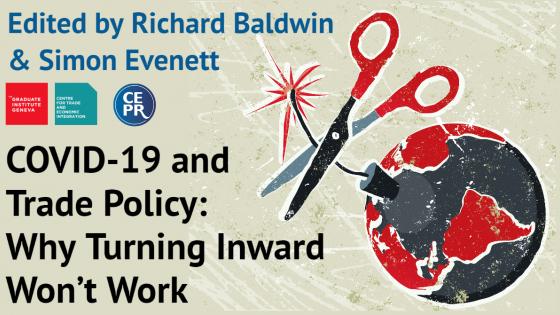Dear Director-General,
Congratulations on your appointment. Bravo for taking up the challenge of revivifying a central pillar of multilateral governance, the World Trade Organization (Krueger 2020). We’re sure you don’t underestimate the scale of the challenge before you, but we hope you share our view that the present global crisis also represents an opportunity for the organisation, one for which your formidable knowledge of development and policymaking is well suited to seizing.
In anticipation of a successfully concluded Director-General selection process, we recently edited an eBook (Evenett and Baldwin 2020) bringing together dozens of trade experts from across disciplines and across the world to share doable and practical measures for your consideration. Below, we highlight just some of these.
Near-term focus: Fighting the virus and supporting the economic recovery
While it will not be a novel thought to you and your advisers, now is the time to think big – the WTO faces a series of logjams that have proved resistant to small changes and initiative. For a start, this year affords an excellent opportunity to demonstrate the central role that trade can play in addressing the world’s most pressing problems.
This year that means keeping trade routes open to fight the global pandemic and to speed the global economic recovery.
- Billions of vials of vaccines need to be manufactured and shipped – a fact you are entirely familiar with given your leadership of GAVI.
Tackling Covid-19 requires an open trading system delivering vaccines and their ingredients without disruption (Bhatia 2020, Freund and McDaniel 2020). Syringes and specialist gloves are needed to execute inoculation campaigns (Espita et al. 2020). Air and seaports need to reopen and stay open, with crew changes assured (Bosanquet and Button 2020, Duval 2020, Heiland 2020, Ulltveit-Moe 2020). Shipments by hard hit small and medium-sized firms need trade finance. The WTO can and must step up and negotiate rules, or best practices, for national export restrictions on medical supplies. The need for global trade leadership makes it plain that your remit goes well beyond the policies covered by the global trade deal signed in 1993 – broader debates, such as proposals to repatriate cross-border supply chains and to make them more resilient (Miroudot 2020), should be within your scope.
In short, the pandemic–trade nexus has opened a historic chance for the head of the World Trade Organization to become a global champion for saving lives. Fighting Covid-19 is mostly a matter for national governments, but the WTO has a key role. The pandemic won’t be over anywhere until it is over everywhere, and trade will be critical to defeating it globally.
Pragmatically, this could start with a push – led by you – to start the snowball rolling toward a memorandum of understanding to keep trade routes open in medical goods and vaccines (see the ideas in Evenett and Winters 2020 and Espita et al. 2020).
- Economic recovery requires a trade recovery.
The world economy was shocked into one of the deepest recessions since WWII. Things are improving, but, as the IMF’s Chief Economist Gita Gopinath writes: “While the global economy is coming back, the ascent will likely be long, uneven, and uncertain” (see Figure 1).
Figure 1 Merchandise trade volume optimistic and pessimistic scenarios (Index, 2011Q1=100)
Source: WTO Secretariat estimates (https://www.wto.org/english/news_e/pres20_e/pr862_e.htm)
Recession-fighting is a task dealt with primarily at home, but some matters require international cooperation. This is something you could help with. The WTO is all about rules that foster transparency and predictability, and thus reduce trade tensions and uncertainty, increasing entrepreneurship.
As the 2008 Global Financial Crisis unfolded, G20 leaders promised to keep markets open and avoid protectionism. At last year’s G20 Summit, opposition from the Trump administration meant the commitment was far less pointed, but the new management brings new opportunities. Critics may claim that hortatory statements by leaders often have little effect, but a clear statement of intent by G20 leaders would be a powerful signal to businesses around the world that a corner has been turned; that narrow-minded, short-sighted protectionism is no longer on the ascent. Why shouldn’t the WTO Director-General be the one to call for such a statement?
In addition, recession-fighting measures in many nations included a wide range of subsidies that are potentially subject to WTO rules. It is not too early to start thinking about procedures for dealing with the conflicts these subsidies could create. Here, the notification and monitoring functions of the WTO should be strengthened (Ambaw et al. 2020). The fact the WTO secretariat reports stopped reporting detailed information on ‘general economic support’ measures by G20 governments reveals that many trading powers are hostile to scrutiny. Leadership could change this.
Never waste a crisis: Making the WTO a place to address global challenges
A few early wins would impress upon prime ministers and presidents that the WTO is place where global challenges can be addressed. Restoration of WTO centrality in global trade policy could also boost head-of-state and government-level support for more fundamental reforms over the medium term. Our recommendations here are:
- The issue should define the coalition, not vice versa
While multilateralism is part of the WTO’s DNA, it should not become a straitjacket. Plenty of meaningful cooperation takes place in smaller groups and not just in regional trade agreements (see Evenett and Baldwin 2020 for examples). The spirit of the times calls for coalitions of the willing taking initiatives forward. And as for how those coalitions are formed, the issue should define the coalition, not the other way around.
Some time ago we reached the limits of what some high-profile groups could achieve. The G20, for example, did little to integrate economies over the past decade (the best that can be said for the G20 is that it might have curbed some of the protectionist instincts of some of its members). Delays by the Ottawa Group in handling the trade and health file seriously call into question that group’s ability to get meaningful things done. Nurturing emerging made-to-order coalitions is one way that fresh leadership at the WTO could rekindle the organisation’s centrality.
- Boost the WTO’s crisis management capacity
Given that the world economy has faced two systemic crises in less than 15 years – both of which implicate cross-border trade and investment– it would seem natural to boost the WTO’s ability to react to global crises. There are many aspects to this ranging from institutional organisation to data collection and analysis, and from mainstreaming virtual meetings to boosting the engagement of trade ministers. There are many pragmatic ideas on these in the chapters by Anabel Gonzales, Alejandro Jara, Ujal Singh Bhatia, Bernard Hoekman and others in Evenett and Baldwin (2020).
The World Health Organization has crisis management protocols – why shouldn’t the WTO?
- Tune up the WTO Secretariat
Few international organisations boast such a strong roster of dedicated staff with deep subject expertise. For far too long the WTO Secretariat has been shunted to the side lines, much like a Rolls-Royce being left in a barn gathering dust. Time to dust it down and tune it up.
The WTO could become the central clearing house for all information on government policies crimping trade and investment during the pandemic (Dhar 2020, Hoekman 2020, Tu and Li 2020, Ungphakorn 2020). Many WTO members starve the Secretariat of information about policy changes – the time has come to allow the secretariat to gather information directly from government websites and official publications.
Once the WTO’s transparency function starts producing a larger volume of high-quality information, then the next step is to get WTO members to start talking to each other again (as opposed to past each other). Timely, high-quality analytical work by the Secretariat should inform such deliberations (Jara 2020). Discussions should not stay within the usual silos, but must address systemic questions such as the future of supply chains and the measures governments can take to ramp up vaccine production.
We also recommend you get some of your brightest staff to evaluate how well the Secretariat performed during the COVID-19 pandemic and the last systemic economic crisis, the financial crisis of 2008-9 (Low and Wolfe 2020).
- Have an eye to the WTO’s relevance after the pandemic
The regulation of digital trade is an area where the WTO needs to make its mark. Unlike traditional trade reform, with its heavy emphasis on politically unpopular trade liberalisation, most of the initiatives here relate to establishing the rules of the road. Capitalising on the progress made in an ongoing e-commerce negotiation involving a group of WTO members is a priority (van der Marel 2020).
No historian of the 21st century will credit the WTO with relevance if its principles and leadership didn’t shape governments initiatives to foster a low carbon economy (Evenett and Baldwin 2020). Like digital technology, climate-related policymaking is moving faster than trade diplomacy. You and your team don’t have any time to waste as governments are meeting in the first two weeks of November 2021 at the COP26 in Glasgow, Scotland. Identifying which policies contribute the most to addressing climate change while limiting the distortion to trade and investment flows is critical. The goal here is to identify and present policy options that are both more climate-friendly and trade-friendly.
- Women and trade: Translating words into action
The 2017 Buenos Aires Declaration on Trade and Women’s Economic Empowerment was a landmark. However, it was only in September 2020 that the WTO membership established an Informal Working Group to move forward on implementation. Leadership on this issue is sorely missing. As the chapter by Mia Mikic and Vanika Sharma in Evenett and Baldwin (2020) points out, trade, and in particular opening up to trade, has contributed immensely to the economic empowerment of women and to their (and their children’s/families’) improved quality of living, education, health. However, there is also substantial evidence that much more needs to be done. The chapter contains a number of pragmatic suggestions for implementing and advancing the intentions agreed to in the Buenos Aires Declaration.
- Figure out the common denominator: The WTO’s purpose
WTO membership comprises 164 governments and a strong glue is necessary to hold them together. For decades, that glue was a common belief that a universal, rules-based trade system was in everyone’s best interest. That is no longer enough. Geoeconomics have shifted and domestic politics has come to blame globalisation for the social ills experienced by the middle and working classes in some of the organisation’s key members. A new context calls for a new glue. Finding that glue could be one of the greatest legacies of your tenure.
In listening to trade diplomats talk past each other in Geneva over the past decade, we have identified at least eight imperatives that could inform what governments want the WTO to achieve over the next decade. It is important to frame this matter in terms of what the WTO should do rather than retreating into a safer and less meaningful discussion of shared principles (the Saudi G20 Presidency tried the latter approach, with predictable results). The introduction we wrote in the recent eBook laid out the eight (Evenett and Baldwin 2020).
You could, as Director-General, encourage a quiet conversation among the WTO membership on what they want this organisation to accomplish over the coming decade. As the discussion is intensely political, it might best be championed by national capitals rather than Geneva-based representatives alone.
Concluding remarks
COVID-19 and its consequences provide an opportunity to demonstrate the world trading system’s societal relevance and to counter the sceptics who have for years traduced the WTO and its accomplishments. It will not be easy and there will be tough discussions ahead. The night is darkest, as they say, just before dawn. We believe that the year 2021 could – under your leadership – prove to be a very bright dawn for the organisation.
References
Ambaw, D, P Draper and H Gao (2020), “Lessons from the pandemic for the WTO subsidy rules”, in S J Evenett and R E Baldwin (eds), Revitalising Multilateralism: Pragmatic Ideas for the New WTO Director-General, CEPR Press.
Bhatia, U (2020), “COVID-19 and beyond: What the WTO can do”, in S J Evenett and R E Baldwin (eds), Revitalising Multilateralism: Pragmatic Ideas for the New WTO Director-General, CEPR Press.
Bosanquet, C B and K J Button (2020), “Reviving air transportation and global commerce”, in S J Evenett and R E Baldwin (eds), Revitalising Multilateralism: Pragmatic Ideas for the New WTO Director-General, CEPR Press.
Dhar, B (2020), “Technical regulations in the WTO: The need to improve transparency”, in S J Evenett and R E Baldwin (eds), Revitalising Multilateralism: Pragmatic Ideas for the New WTO Director-General, CEPR Press.
Duval, Y (2020), “Lessons from the pandemic for trade facilitation and the WTO”, in S J Evenett and R E Baldwin (eds), Revitalising Multilateralism: Pragmatic Ideas for the New WTO Director-General, CEPR Press.
Espitia, A, N Rocha, and M Ruta (2020), “A pandemic trade deal: Trade and policy cooperation on medical goods”, in S J Evenett and R E Baldwin (eds), Revitalising Multilateralism: Pragmatic Ideas for the New WTO Director-General, CEPR Press.
Evenett, S J and R E Baldwin (eds) (2020), Revitalising Multilateralism: Pragmatic Ideas for the New WTO Director-General, CEPR Press.
Evenett, S J and L A Winters (2020), "Preparing for a second wave of COVID-19: A trade bargain to secure supplies of medical goods", UKTPO Briefing Paper No. 40.
Freund, C and C McDaniel (2020), “Three steps to facilitate global distribution of a COVID-19 vaccine”, in S J Evenett and R E Baldwin (eds), Revitalising Multilateralism: Pragmatic Ideas for the New WTO Director-General, CEPR Press.
Heiland, I and K H Ulltveit-Moe (2020), “Cumulative COVID-19 restrictions and the global maritime network”, in S J Evenett and R E Baldwin (eds), Revitalising Multilateralism: Pragmatic Ideas for the New WTO Director-General, CEPR Press.
Hoekman, B M (2020), “COVID-19 trade policy measures, G20 declarations and WTO reform”, in S J Evenett and R E Baldwin (eds), Revitalising Multilateralism: Pragmatic Ideas for the New WTO Director-General, CEPR Press.
Jara, A (2020), “Against the clock: Eight Steps to improve the WTO crisis management”, in S J Evenett and R E Baldwin (eds), Revitalising Multilateralism: Pragmatic Ideas for the New WTO Director-General, CEPR Press.
Krueger, A O (2020), International Trade: What Everyone Needs to Know, Oxford University Press.
Low, P and R Wolfe. (2020), “How the WTO kept talking: Lessons from the COVID-19 crisis”, in S J Evenett and R E Baldwin (eds), Revitalising Multilateralism: Pragmatic Ideas for the New WTO Director-General, CEPR Press.
Miroudot, S (2020), “Lessons from the pandemic for trade cooperation on cross-border supply chains”, in S J Evenett and R E Baldwin (eds), Revitalising Multilateralism: Pragmatic Ideas for the New WTO Director-General, CEPR Press.
Tu, X and S Li (2020), “Lessons from the pandemic for FDI screening practices”, in S J Evenett and R E Baldwin (eds), Revitalising Multilateralism: Pragmatic Ideas for the New WTO Director-General, CEPR Press.
Ungphakorn, P (2020), “Lessons from the pandemic for WTO work on agricultural trade and support”, in S J Evenett and R E Baldwin (eds), Revitalising Multilateralism: Pragmatic Ideas for the New WTO Director-General, CEPR Press.
Van der Marel, E (2020), “Lessons from the pandemic for trade cooperation in digital services”, in S J Evenett and R E Baldwin (eds), Revitalising Multilateralism: Pragmatic Ideas for the New WTO Director-General, CEPR Press.




